Posted January 16, 2021 by Nicky in Reviews / 0 Comments
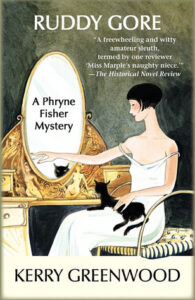 Ruddy Gore, Kerry Greenwood
Ruddy Gore, Kerry Greenwood
Blood and Circuses didn’t quite satisfy the hunger for rereading Phryne’s adventures, since it’s atypical in some ways. I joked on Litsy that I was rereading the series for the delicious dresses and beautiful food (with the adjectives that way round!) — and there’s certainly a good helping of that here, along with the first appearance of Phryne’s Chinese lover, Lin Chung. I can’t speak for how accurate or respectful his portrayal is; Greenwood is certainly sympathetic to the Chinese people living in Melbourne at the time, but there’s a fair amount of exoticisation going on there (as there is with Phryne herself, of course, but still).
Never having really known a serious actor personally, I find the way Greenwood portrays them bewilderingly malicious at times. I mean, Sir Bernard isn’t so bad, and Mollie Webb, but there’s so much spite, vanity and callousness flying around… particularly in the person of the beautiful Leila Esperance.
In any case, it’s a pretty fun one, and especially entertaining to see Greenwood portray a Welshman (even one who’s such a cad).
Rating: 4/5
Tags: book reviews, books, crime, Kerry Greenwood, mystery
Posted January 15, 2021 by Nicky in Reviews / 0 Comments
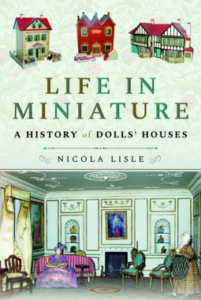 Life in Miniature, Nicola Lisle
Life in Miniature, Nicola Lisle
Received to review; published November 23rd 2020
Life in Miniature is a bit of a survey of dolls’ houses, mostly a descriptive one, which talks about some key examples in order to illustrate trends over the years, and ends with a chapter of advice for those interested in collecting dolls’ houses themselves. I’m not; I was more interested in this as a microhistory, and it does do a little of that, discussing the things dolls’ houses stood for, for those who owned them, and how trends developed.
For me, though, it was a bit too much plain description, too many descriptions of particular houses rather than the higher-level trends. Maybe there isn’t more to analyse about dolls’ houses, or the style is different to other microhistories I have loved… but it just didn’t turn out the way I hoped.
That said, if you’re a big fan of dolls’ houses and you’d like to know more about what’s out there, this book would be a great guide.
Rating: 3/5
Tags: book reviews, books, history, Nicola Lisle, non-fiction
Posted January 15, 2021 by Nicky in Reviews / 0 Comments
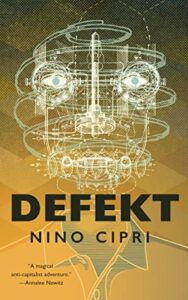 Defekt, Nino Cipri
Defekt, Nino Cipri
Received to review via Netgalley; publication date 20th April 2021
I didn’t love Finna, though I liked it; it felt it leaned a bit too much on being angry about soul-sucking capitalism (which, same, but the choir can get tired of being preached to). Defekt is set in the same world, and briefly crosses over with Finna (we see Jules right before the events of that book), but for whatever reason it worked a bit better for me — it felt a little less preachy, and I loved the idea of all those sentient furnishings. The toilet is a highlight (seriously).
I was a little bit put off by the “self-cest” thing, though: Derek is the main character, and after he takes an uncharacteristic sick day, he has to do a special inventory shift. During the shift, he meets four of his clones, and finds himself particularly drawn to one of them. Sure, that one is quite different to him in many ways, but the potential romance between them was a bit of an odd note for me.
Still, a fun novella, and I suspect those who already enjoyed Finna will enjoy this at least as much.
Rating: 4/5
Tags: book reviews, books, Nino Cipri, queer fic, SF/F
Posted January 13, 2021 by Nicky in Reviews / 0 Comments
 Blood and Circuses, Kerry Greenwood
Blood and Circuses, Kerry Greenwood
Blood and Circuses is, of course, a reread for me — the book in which Phryne Fisher joins the circus to work out a mystery, at the pleading (and goading) of her carnie friends… while at the same time, a horrible murder has taken place which Jack Robinson must investigate. It’s always interesting to see Phryne out of her element, because that’s when she has to be her most resourceful, and the circus is a whole new world for her.
There’s also Lizard Elsie, and her adventures with Miss Parkes and Constable Harris, which keep things entertaining (to say the least).
It always feels like it takes a while to heat up, and then suddenly flies by once Phryne’s there in the circus. It’s surprising to realise how fast it goes. I always enjoy this one, and I’m particularly entertained (as ever!) by the scene in which the clown and the carnie have to cuddle Phryne to help her get over her shock…
Rating: 4/5
Tags: book reviews, books, crime, Kerry Greenwood, mystery
Posted January 13, 2021 by Nicky in Reviews / 2 Comments
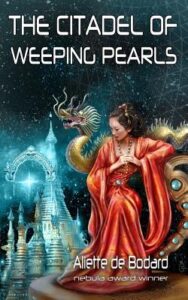 The Citadel of Weeping Pearls, Aliette de Bodard
The Citadel of Weeping Pearls, Aliette de Bodard
I really need to read more of the Xuya stories and novellas all at once, because I like the world but it always takes me some adjustment time. The Citadel of Weeping Pearls stands alone, though, and once you get your head around the fact that it’s based on Vietnamese culture and customs (but in a space empire), it flows along smoothly. Bright Princess Ngoc Minh has been missing for years, along with her Citadel, after her mother the Empress sent armies against her. Grand Master Bach Cuc has been searching for her, and seemed to be close to a breakthrough, but now she’s missing — and Diem Huong, a commoner who lost her mother on the Citadel, is also about to conduct an experiment that may send her to the Citadel.
I found that the only thing that bothered me was the number of POVs, and that was mostly while I was settling into the story. It was obvious why we needed the various POVs by the end; without them, the Empress seems just horrible (instead of a woman who makes horrible decisions believing they are for everyone’s good, which is a different sort of horrible), Ngoc Ha seems too wishy-washy… but together they all work out and show a sad story, examining the bonds between families, and the terrible things an Empress might do for the good of everyone (or not).
It works really well as a novella; I think it’s perfect at this length.
Rating: 4/5
Tags: Aliette de Bodard, book reviews, books, mystery, SF/F
Posted January 12, 2021 by Nicky in Reviews / 0 Comments
 The Bookseller’s Tale, Martin Latham
The Bookseller’s Tale, Martin Latham
I feel like this book wasn’t quite sure what it was. History of the book? History of access to books? History of what people think about books? Autobiography of Martin Latham? There’s some genuinely interesting stuff sandwiched in between Latham making sure we know that he worked for Tim Waterstone and knew a bunch of famous people before you could Google them. Sometimes his anecdotes work to illustrate the narrative he’s trying to spin… and sometimes he’s telling us about weird dreams he had.
It was also full of this… reverence for the codex (not the contents) as a physical object, and being passionately in love with the physical form of a book. He’s a fan of physical books you can fondle, annotate, spill things on, write your name in… And I can get it, to some extent, but you’d think people aren’t real readers if they don’t like to caress books or crease spines or whatever. He does bring across the sensual enjoyment of books, and what a delight that can be for some people, but, yeah, just not sure about this absolute lionising of the codex-form of books above all else, above even the contents (which he rarely discusses in detail).
I expected to love this, but found myself fairly nonplussed. Overall, I can’t say I really enjoyed it — something about Latham and me just didn’t click, for a start.
Rating: 2/5
Tags: book reviews, books, history, Martin Latham, non-fiction
Posted January 12, 2021 by Nicky in Reviews / 0 Comments
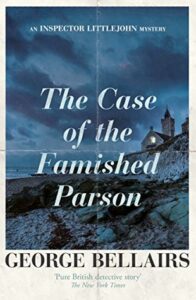 The Case of the Famished Parson, George Bellairs
The Case of the Famished Parson, George Bellairs
Inspector Littlejohn is supposed to be on holiday, taking a break after running himself into the ground on too many cases. As ever, a busman’s honeymoon is sure to follow, and Littlejohn finds himself investigating the murder of a parson, found in an astonishingly emaciated state with his head bashed in. Needless to say, it isn’t a very restful holiday, and Littlejohn even finds himself shot while he’s still making routine inquiries…
When I first read one of Bellairs’ books in the British Library Crime Classics, I thought it was fun, and I’ve definitely found that to be so with all his books. Maybe not the most inventive or technically brilliant, but likeable. I feel like Bellairs really enjoyed writing these books, these competent mysteries where the world is restored to rights by the finding and apprehending of the killer — without police violence, without prying too deeply into people’s psyches. Somehow cosy, even when the crimes are horrible. The Case of the Famished Parson fits well into that mould, and I enjoyed it very much.
I do have to say that I’d expected something a bit more weird, from that title. In the end, the fact that the man was starving is the least part of the mystery — easily sorted out, though it does have a part to play in explaining what happened.
I probably won’t be picking up another book by Bellairs immediately — but I’ll definitely be picking one up again in the near-ish future. They’re even on Kindle Unlimited!
Rating: 4/5
Tags: book reviews, books, crime, George Bellairs, mystery
Posted January 8, 2021 by Nicky in Reviews / 0 Comments
 The Gabriel Hounds, Mary Stewart
The Gabriel Hounds, Mary Stewart
I was really in the mood to reread one of Mary Stewart’s novels, and I felt pretty nostalgic about The Gabriel Hounds. I thought I’d remember it pretty well, but there was actually a bit in the middle I was more vague on and that I could swear had happened in a different Mary Stewart book… In any case, The Gabriel Hounds follows Christy, separated from her group on a package tour of the Lebanon. Reminded that her great-aunt lives in the area, and surprised by the legends that seem to have grown up around her, Christy resolves to see the old lady — and thus finds herself plunged into a whole mess.
As ever, Stewart had an excellent way of bringing the landscape to life, not just the sights (I can’t imagine those anyway) but the smells and the impressions, and even somehow something of the light and the quality of the air. She’s very good at invoking an idealised, picturesque landscape — and some real nastiness, as well, of course, but that’s more commonplace. She’s not so bad with character, either — spoiled, sharp Christy; kind Hamid, who almost felt like he should be a bigger character or get some much better reward out of the story; poor Lethman…
I should warn readers that the love interests are full cousins, whose fathers were twins; cousin-marriage happens a couple of times in Mary Stewart’s books, but this one is closer than most, and lays particular emphasis on the two growing up like siblings. It might gross you out, so I mention it even though it’s a spoiler.
The actual plot is fairly obvious, and the romance almost perfunctory… but it has a kind of magic anyway.
Rating: 4/5
Tags: book reviews, books, crime, Mary Stewart, mystery, romance
Posted January 7, 2021 by Nicky in Reviews / 0 Comments
 Long Live the Post Horn! Vigdis Hjorth, trans. Charlotte Barslund
Long Live the Post Horn! Vigdis Hjorth, trans. Charlotte Barslund
I’ll confess that I read this book pretty much solely because it involves saving a postal service, and I’ve been reading a few books which involve post and postal services in order to stock up on reviews for Postcrossing’s blog. Long Live the Post Horn! is a drifting, rambling novel in which a woman having a mid-life crisis about everything being fake and meaningless recovers her passion through getting involved in the fight to save the postal service from an EU initiative to introduce competition.
The problem for me is that rambling, wishy-washy quality — that stream-of-consciousness has never been my style. There are a couple of bits I liked, bits which capture some of the joy of post in particular, and also a scene in which the main character’s boyfriend explains he sends letters to himself as a sort of life coach — something about that felt distinctive and endearing, rather than kind of generic as in the rest of the book.
Not one I enjoyed — the narrator who never quite knows what she’s doing or why will never really work for me — but I’m sure there are people who will.
Rating: 2/5
Tags: book reviews, books, Vigdis Hjorth
Posted January 7, 2021 by Nicky in Reviews / 2 Comments
 The Faerie Hounds of York, Arden Powell
The Faerie Hounds of York, Arden Powell
The Faerie Hounds of York did not quite go the places I expected it to. It started off with Loxley finding himself in a fairy ring, rescued by a gruff but kind stranger, Thorncress. Warned to leave the area and get himself to London, away from Faerie influence, Loxley quickly finds himself under Thorncress’s care again. A bond is forming between them, as Thorncress tells Loxley he will help him solve his mystery and get free of the Faerie… if it’s possible.
There’s one hell of a moment with this book which I didn’t expect, given the genre; I shouldn’t say too much unless I spoil the impact, because it turned a story I was mildly enjoying into something more intriguing for me. Some aspects of the romance genre are still here, but there’s a subversion of certain expectations which put me on the back foot. I shouldn’t say too much about that!
I enjoyed the characters and the bond they form, but that moment of subverted expectation might’ve been the best bit — I could otherwise have wished for more build-up, more familiarity with the inner lives of the characters (particularly Thorncress). On the other hand, then there’d be less mystery… In any case, definitely enjoyable.
Rating: 3/5
Tags: book reviews, books, queer fic, romance, SF/F
 Ruddy Gore, Kerry Greenwood
Ruddy Gore, Kerry Greenwood








